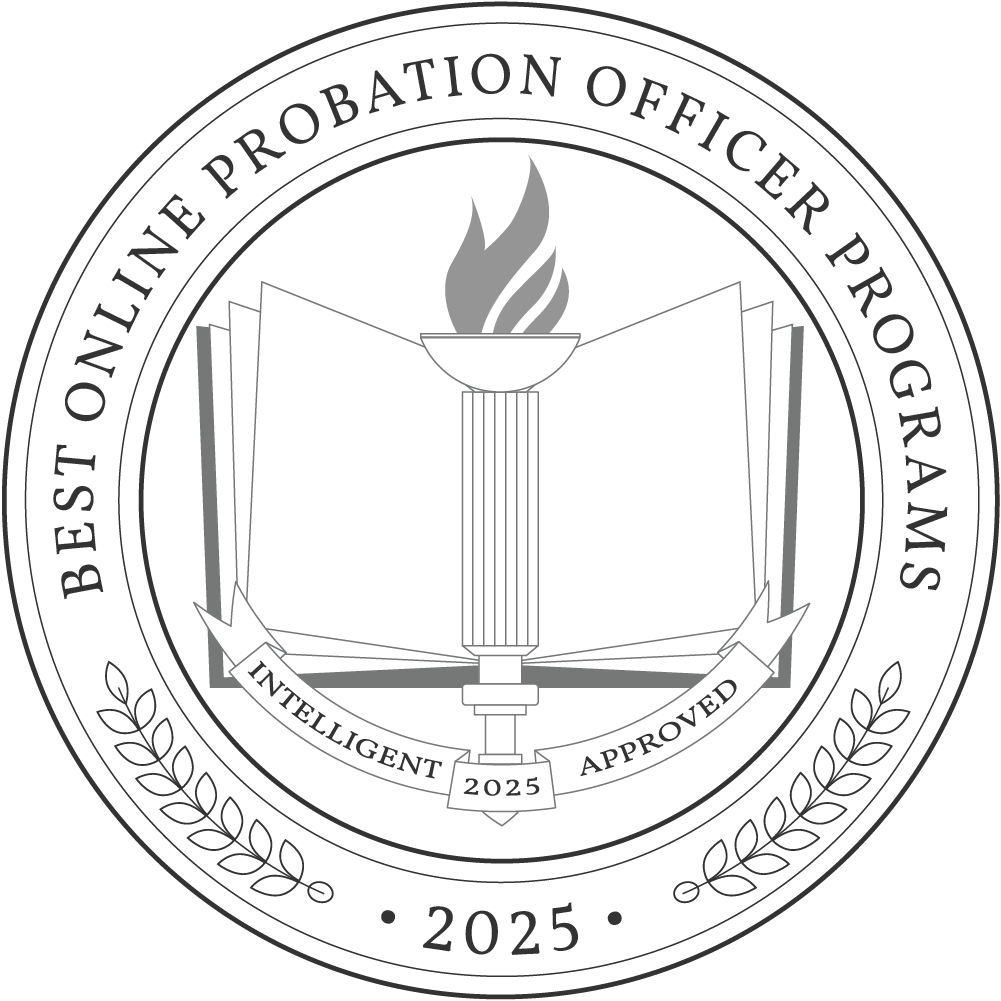An online probation officer degree program equips students with the skills and knowledge needed to oversee offenders, ensuring they comply with probation terms and aiding their rehabilitation. Graduates are prepared for roles such as probation officer, correctional treatment specialist, and case manager.
According to the Bureau of Labor Statistics, probation officers and correctional treatment specialists earn an average annual salary of $61,800. Typically, these programs can be completed with about four years of full-time study, though part-time options may extend this duration. Costs vary widely depending on the institution, but the National Center for Education Statistics reports that the average annual tuition for an undergraduate degree ranges from around $8,000 at public institutions to $38,000 at private ones.
Why Trust Us
The Intelligent.com Higher Education Team is dedicated to providing students with independent, equitable school and program rankings and well-researched resources. Our expert-driven articles cover topics related to online colleges and programs, paying for school, and career outlooks. We use data from the U.S. Department of Education’s College Scorecard, the National Center for Education Statistics, and other reputable educational and professional organizations. Our academic advisory team reviews content and verifies accuracy throughout the year for the most current information. Partnerships do not influence rankings or editorial decisions.
- Analyzed over 2,000 national, accredited, and nonprofit colleges and universities
- 800+ rankings pages are reviewed and updated yearly
- Content is informed by reputable sources, surveys, and interviews with academic advisors and other experts
- Over 100 data points are reviewed for accuracy and quality throughout the year, including sources
How we rank schools
Our list features the best online Probation Officer degree programs at top colleges nationwide. Each school featured is a nonprofit, accredited institution — either public or private — with a high standard of academic quality for post-secondary institutions.
We evaluated each school’s program on tuition costs, admission, retention and graduation rates, faculty, reputation, and the student resources provided for online students. We collected data from trusted sources like the National Center for Education Statistics, individual school and program websites, school admissions counselors, and other data sources. Then, we calculated the Intelligent Score on a scale of 0 to 100 based on the following criterion:
Academic Quality:
- Admission rate versus enrollment rate
- Retention rate of students who return after year one
- Accreditation status (regional and programmatic)
- Nonprofit status, both private and public institutions
Graduation Rate
- Overall graduation rate
- Total number of currently enrolled students, including diversity metrics
- Student-to-faculty ratio
Cost and ROI
- In-state and out-of-state per-credit tuition rates and fees
- Required credits to graduate
- Earning potential after graduation
- Availability of federal student loans, scholarships, and other financial aid options
Student Resources
- Available student services for online-only and hybrid programs
- On-campus amenities like tutoring centers and the number of libraries
Read more about our ranking methodology.
Best 32 Accredited Online Probation Officer Programs
FiltersInstitution Type
Status
- Intelligent Score
- Alphabetically By University Name
- Acceptance Rate
- Enrollment
- In-state Graduate Tuition
- Out-of-state Graduate Tuition
- In-state Undergraduate Tuition
- Out-of-state Undergraduate Tuition

Indiana University East
Intelligent Score: 99.72In-state: $9,815
Out-of-state: $36,194
In-state: $9,786
Out-of-state: $9,786
SAT: 1120-1350
ACT: 24-31
$272.78 per credit
Online
Higher Learning Commission
120 credits

Wayne Community College
Intelligent Score: 97.07In-state: $16,015
Out-of-state: $16,750
In-state: NA
Out-of-state: NA
SAT: N/A
ACT: 18-22
$172 per credit
Online, On-Campus
Southern Association of Colleges and Schools Commission on Colleges
73-74 credits

Lee University
Intelligent Score: 96.87In-state: $18,840
Out-of-state: $18,840
In-state: $14,130
Out-of-state: $14,130
SAT: 970-1200
ACT: 21-27
$554.12 per credit
Online
Southern Association of Colleges and Schools Commission on Colleges
120 credits

Colorado State University Global
Intelligent Score: 96.41In-state: $9,426
Out-of-state: $28,147
In-state: $10,520
Out-of-state: $10,520
SAT: 1070-1280
ACT: 23-29
$350 per credit
Online
Higher Learning Commission
120 credits

Liberty University
Intelligent Score: 95.29In-state: $14,791
Out-of-state: $14,791
In-state: $7,935
Out-of-state: $7,935
SAT: 1040-1250
ACT: 21-29
$390 per credit
Online
Southern Association of Colleges and Schools Commission on Colleges
120 credits

University of Louisville
Intelligent Score: 94.88In-state: $11,966
Out-of-state: $28,312
In-state: $13,260
Out-of-state: $13,260
SAT: 1050-1270
ACT: 21-28
$539 per credit
Online
Southern Association of Colleges and Schools Commission on Colleges
121 credits

University of Tennessee at Chattanooga
Intelligent Score: 94.43In-state: $11,332
Out-of-state: $28,522
In-state: $11,468
Out-of-state: $11,468
SAT: 1140-1303
ACT: 25-31
$895 per credit
Online
Southern Association of Colleges and Schools Commission on Colleges
120 credits

University of Alaska Fairbanks
Intelligent Score: 94.13In-state: $27,590
Out-of-state: $44,590
In-state: $29,182
Out-of-state: $29,182
SAT: 1110-1360
ACT: 17-27
$223 per credit
Online
Northwest Commission on Colleges and Universities
120 credits

University of California, Irvine
Intelligent Score: 94.06In-state: $11,442
Out-of-state: $41,196
In-state: $11,442
Out-of-state: $11,442
SAT: 1310-1530
ACT: 30-35
$553.62 per credit
Online
Western Association of Schools & Colleges Senior College & University Commission
52 credits

McNeese State University
Intelligent Score: 93.88In-state: $5,147
Out-of-state: $13,185
In-state: $5,703
Out-of-state: $5,703
SAT: 1050-1240
ACT: 20-25
$1,077.50 per credit
Online, On-Campus
Southern Association of Colleges and Schools Commission on Colleges
120 credits

Florida International University
Intelligent Score: 92.58In-state: $4,721
Out-of-state: $16,529
In-state: $8,912
Out-of-state: $8,912
SAT: 1110-1260
ACT: 23-29
In-State: $228.81 per credit
Out-of-State: $345.87 per credit
Online, On-Campus
Southern Association of Colleges and Schools Commission on Colleges
120 credits

University of Wisconsin Oshkosh
Intelligent Score: 90.74In-state: $9,273
Out-of-state: $37,161
In-state: $10,728
Out-of-state: $10,728
SAT: 1260-1460
ACT: 27-32
$360 per credit
Online
Higher Learning Commission
120 credits

Troy University
Intelligent Score: 90.11In-state: $7,800
Out-of-state: $15,600
In-state: $7,650
Out-of-state: $7,650
SAT: 935-1105
ACT: 18-25
$494 per credit
Online, On-Campus
Southern Association of Colleges and Schools Commission on Colleges
36 credits

Valdosta State University
Intelligent Score: 89.81In-state: $4,371
Out-of-state: $15,426
In-state: $4,572
Out-of-state: $4,572
SAT: 990-1140
ACT: 19-23
$293 per credit
Online, Hybrid
Southern Association of Colleges and Schools Commission on Colleges
36 credits

University of Florida
Intelligent Score: 88.95In-state: $4,477
Out-of-state: $25,694
In-state: $10,770
Out-of-state: $10,770
SAT: 1290-1460
ACT: 29-33
$340.50 per credit
Online
Southern Association of Colleges and Schools Commission on Colleges
120 credits

The University of Oklahoma
Intelligent Score: 88.73In-state: $4,788
Out-of-state: $20,169
In-state: $6,943
Out-of-state: $6,943
SAT: 1100-1300
ACT: 23-29
$415.95 per credit
Online
Higher Learning Commission
15 credits

Lamar University
Intelligent Score: 87.65In-state: $6,129
Out-of-state: $15,945
In-state: $6,397
Out-of-state: $6,397
SAT: 943-1140
ACT: 17-23
$248 per credit
Online
Southern Association of Colleges and Schools Commission on Colleges
120 credits

Saint Leo University
Intelligent Score: 85.51In-state: $23,990
Out-of-state: $23,990
In-state: $14,568
Out-of-state: $14,568
SAT: N/A
ACT: N/A
$590 per credit
Online
Southern Association of Colleges and Schools Commission on Colleges
36 credits
How to Choose an Online Probation Officer Degree Program
Choose your area of study
Identify your interests, such as juvenile justice, substance abuse counseling, or rehabilitation services. Research each specialization to understand its career prospects, required skills, and potential impact on your future job satisfaction. Speak with academic advisors and professionals in the field to gain insights and make informed decisions. Evaluate how each area aligns with your long-term career goals and personal values. This approach ensures that your studies are relevant and enhances your ability to undertake specific roles in the criminal justice system.
Research schools and programs
Make a list of accredited institutions with appealing programs, ensuring they meet educational standards and are recognized by employers. Look into each program’s curriculum to confirm it covers essential topics such as criminal justice, rehabilitation, and case management. Investigate faculty qualifications to ensure you’ll learn from experienced professionals. Examine student support services, including career counseling and internship opportunities, which are crucial for both practical experience and job placement. Compare tuition costs and financial aid options to assess affordability.
Prepare for tests and applications
Take a close look at the specific requirements of each program, such as standardized test scores like the SAT or ACT. Use study guides and practice tests to enhance your performance. Gather necessary documents, including high school transcripts and any prior college credits. Craft a compelling personal statement that highlights your interest in criminal justice and career goals. Gather strong letters of recommendation from teachers or professionals who can attest to your abilities and character. Proofread all documents carefully before submitting them to make sure there are no mistakes, which could be flagged by reviewers.
Select your program
Begin your selection process by confirming that the program you are interested in is accredited by a regional or national accreditation body, ensuring that it will be well-received by employers. Review the curriculum to confirm it includes courses in criminal justice, sociology, rehabilitation techniques, and other topics of interest to you. Consider the program’s flexibility, especially if you need to balance studies with work or other commitments. Investigate the availability of internships or fieldwork opportunities. Look into the support services offered, such as academic advising and career counseling.
Determine how you’ll pay for your degree
Estimate the total cost of your education, including tuition, fees, and study materials. Completing the Free Application for Federal Student Aid (FAFSA) is essential to determine your eligibility for federal grants, loans, and work-study opportunities. Research scholarships specifically for criminal justice students, which can significantly reduce your financial burden. Explore state-funded financial aid programs and institutional scholarships offered by your chosen school. Consider part-time work or internships related to your field, which can provide both income and valuable experience.
What Can You Expect From an Online Probation Officer Degree Program?
Enrolling in an online probation officer degree program provides comprehensive training for a career in the criminal justice system. Prospective students can expect to learn about the legal system, rehabilitation strategies, case management, and the psychological aspects of criminal behavior. Core courses typically include criminal law, sociology, psychology, and corrections, offering a broad understanding of how to manage and rehabilitate offenders effectively.
Program duration generally spans four years for full-time students, resulting in a bachelor’s degree. Part-time options are available, which can extend the completion time. While most coursework is delivered online, some programs may require in-person components such as labs, workshops, or residencies. These elements are crucial for developing practical skills in areas like interviewing, counseling, and crisis intervention.
Students should also be prepared for internships or fieldwork, which offer real-world experience in probation settings and are often mandatory for graduation. These practical experiences not only enhance learning but also improve employment prospects post-graduation.
Potential courses you’ll take in an online probation officer degree program
- Criminal Law. Covers the fundamentals of criminal law, including definitions of crimes, criminal liability, and legal defenses. Students will learn about the judicial process and how laws are applied in the context of probation and parole.
- Sociology of Crime and Deviance. Examines the social factors that contribute to criminal behavior and deviance. Students will explore theories of crime causation, the impact of societal norms, and the role of social institutions in regulating behavior.
- Case Management in Criminal Justice. Focuses on the skills needed for effective case management, teaching students how to assess offenders, develop rehabilitation plans, and monitor compliance with probation conditions. It also covers documentation and reporting techniques essential for probation officers.
- Psychology of Criminal Behavior. Delves into the psychological underpinnings of criminal behavior, including personality disorders, mental illness, and substance abuse. Students will learn about assessment tools and therapeutic interventions used to rehabilitate offenders.
- Corrections and Rehabilitation. Studies various correctional approaches and rehabilitation strategies, including incarceration, probation, and community-based programs. The course emphasizes evidence-based practices aimed at reducing recidivism and supporting offender reintegration into society.
Online Probation Officer Degree Frequently Asked Questions
How do I apply to an online probation officer degree program?
Visit the program’s website and complete their online application. Prepare to submit official high school transcripts or proof of GED completion, along with any prior college transcripts if applicable. Many programs also require letters of recommendation that speak to your academic potential or professional capabilities. Some may request standardized test scores like the SAT or ACT, although requirements vary. Craft a compelling personal statement outlining your interest in criminal justice. Before applying, it’s beneficial to schedule a consultation with an admissions counselor. They can provide guidance on specific admission criteria, discuss program expectations, and ensure that all required materials are submitted accurately and on time.
How much does an online probation officer degree cost?
The cost of earning an online degree can vary widely depending on the institution and whether you attend full-time or part-time. On average, the tuition for online bachelor’s degrees in criminal justice ranges from approximately $8,000 to $38,000 per year. Public institutions are generally more affordable than private, but financial aid packages can greatly impact the cost of a private school education. Additional costs may include fees for technology, online resources, and textbooks. Online programs often offer savings on commuting and housing expenses compared to traditional in-person programs, but tuition rates can be comparable.
How long does it take to earn an online probation officer degree?
Earning your degree typically takes about four years of full-time study, equivalent to completing approximately 120 credits. Part-time enrollment options are available, which can extend the timeline based on individual pacing. Online programs often offer flexibility in scheduling and course delivery, allowing students to balance studies with work or personal commitments. Online programs are also more likely to offer accelerated options or allow students to progress at their own pace.

